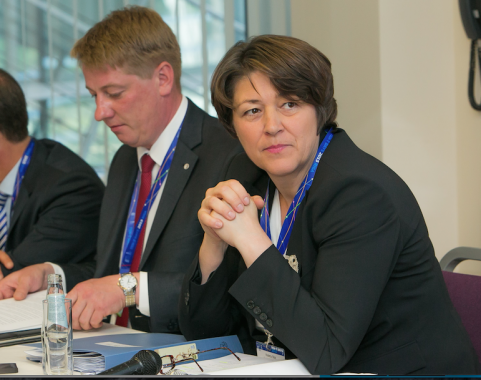
Photo: Violeta-Bulc-Anrijs-Matiss
European Commission to support rollout of mobility indicators
10 May 2016
by Steve Hoare
The European Commission has endorsed the sustainable mobility indicators developed by the World Business Council for Sustainable Development (WBCSD).
The Commission is understood to be working on processes to support cities using the indicators. This could include the possibility of putting together a consortium to help cities with data collection as well as putting in place a financial scheme.
“We encourage cities to make use of [the WBCSD toolkit], both to assess their current situation and to monitor the results of their urban mobility strategy and measures,” said Violeta Bulc, the European Commissioner for Transport.
The indicators were developed by the WBCSD in collaboration with Oran Consulting, Ghent University, the International Transport Forum (ITF) and the Organisation for Economic Cooperation and Development (OECD). They were then tested and refined by Bangkok, Campinas, Chengdu, Hamburg, Indore and Lisbon.
“This project allowed us to have a better understanding of where Lisbon’s mobility strengths and weaknesses are–particularly when compared to other world cities,” commented Manuel Salgado, Lisbon City Councillor for Urban Planning and Mobility. “When we combined the diagnosis we made within the project with the mobility vision we have for Lisbon, the results were very clear and reinforced the idea that we need a clear change in mobility paradigm.”
The indicators combine quantitative data coming out of meters, geographic information systems (GIS) and calculations with qualitative data coming out of surveys. The toolkit leads to an online representation on a spider web of the position of the city on each of the 19 indicators, allowing it to easily diagnose the state of its mobility situation.
The 19 indicators are:
- Affordability of public transport
- Accessibility for mobility impaired groups
- Air pollution
- Noise
- Fatalities
- Access to mobility services
- Quality of public area
- Urban functional diversity
- Commuting travel time
- Economic opportunity
- Net public finance
- Mobility space usage
- Emissions of greenhouse gases
- Congestion and delays
- Energy efficiency
- Opportunity for active mobility
- Intermodal integration
- Comfort and pleasure
- Security











